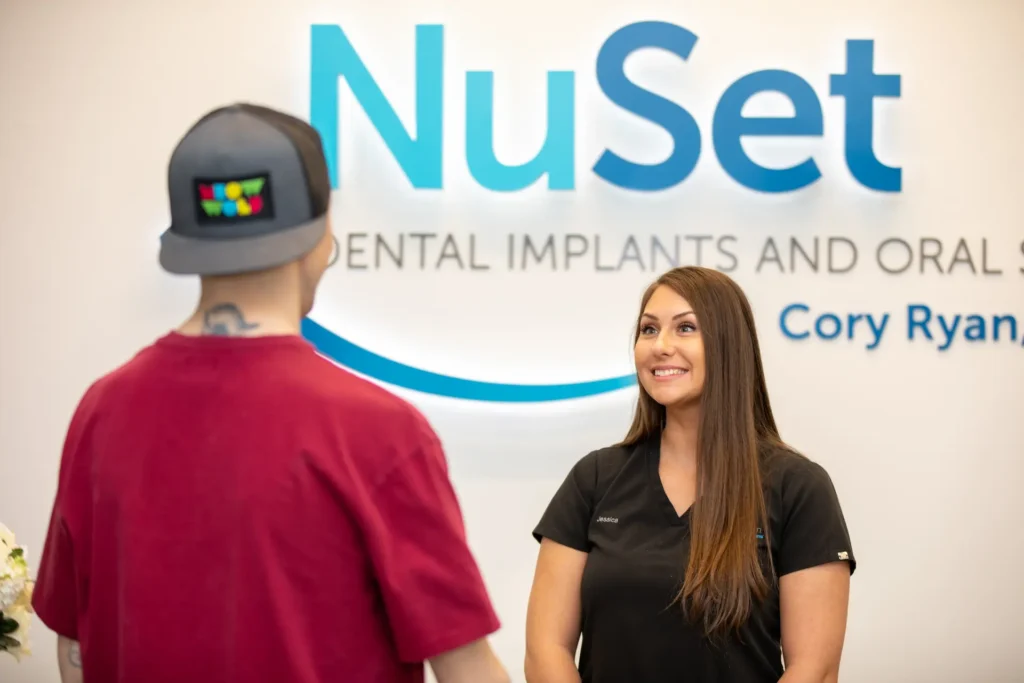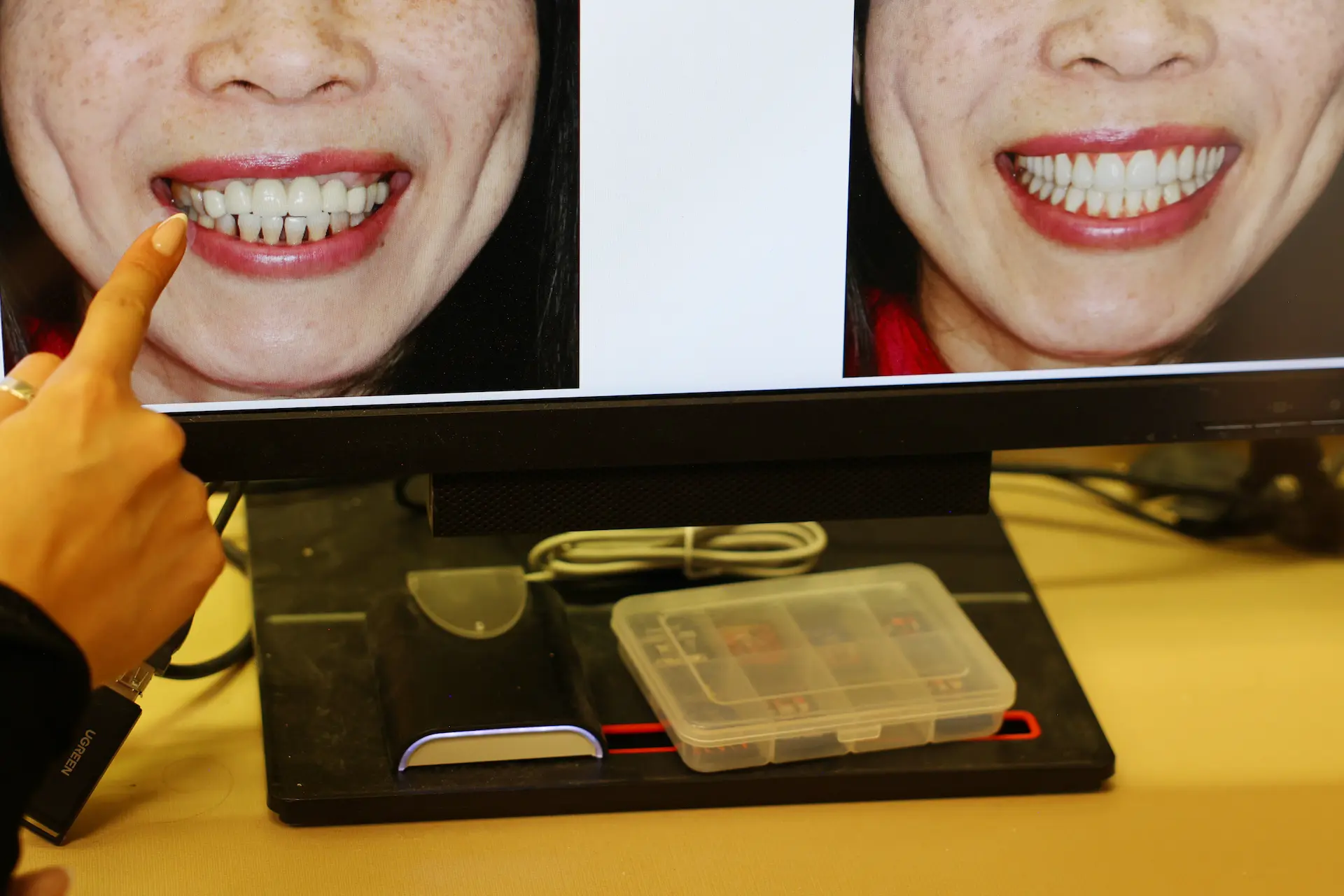Losing a tooth can significantly affect your oral health and how you feel about your smile. Not only does it impact your ability to eat and speak, but it can also lead to bone loss in your jaw over time, changing the shape of your face.
Thankfully, tooth implants offer a modern and effective solution for replacing missing teeth. They provide a durable option that closely mimics the natural structure of your teeth, restoring both the function and aesthetics of your smile.
Let’s discuss how tooth implants work, their benefits, and the process involved.
Key Takeaways
- Tooth implants replace missing teeth with a strong, natural-looking solution by placing an implant post to mimic a tooth root.
- The process involves implant placement, abutment attachment, and final restoration.
- “Teeth in a Day” provides immediate restoration.
- Implants help maintain jawbone health and facial structure, offering lasting comfort and confidence.
What Happens After You Lose a Tooth?
When you lose a tooth, your smile changes, and sometimes you end up losing your smile too. The space left behind can lead to shifting of the surrounding teeth, affecting how your jawbone supports the remaining teeth. Over time, the area of the jaw where the tooth was lost begins to lose bone, potentially altering the structure of your face and causing other teeth to become unstable.
What Are Tooth Implants?
Tooth implants are a great way to replace missing teeth, giving you back a strong and lasting smile. They were invented to create a solid base for new teeth that would stay in place for a long time. These revolutionary implants consist of three main parts: the implant, the abutment, and the crown.
The Implant
This is a small screw that goes into the jawbone. It acts like the root of your new tooth. While both zirconia and titanium are used in dental implants, titanium is most commonly used because it’s durable and can bond well with the bone, making the implant secure.
The Abutment
This is a piece that connects the implant to the crown. After the implant has bonded with the jawbone, the abutment is placed on top. This part ensures the final restoration, such as the crown, can be securely fastened to the implant.
The Dental Crown
The final restoration is made to match the color and shape of your natural teeth. The crown is usually made of materials like porcelain, which are strong enough to chew food and look like real teeth. It fits right on top of the abutment.
All these parts work together to make a new tooth that looks, feels, and works like a natural one. Tooth implants do more than fill gaps in your smile; they also help keep your jawbone healthy and maintain the shape of your face. Thus, they are a smart choice for anyone looking to fix their smile and keep their mouth healthy.
How Do Tooth Implants Work?
Before getting a tooth implant, our oral surgeons and patient consults at Nuset need to ensure that you are getting a specific dental implant plan that suits your unique needs. To start, you’ll sit down with your patient consult to get a better idea of your current dental situation and goals. This usually involves taking detailed images of your jawbone, often using 3D imaging techniques like a Cone Beam Computed Tomography (CBCT) scan.
This type of imaging provides a detailed 3D view of your jawbone, teeth, and nerves. It helps us assess the quality and density of your jawbone to determine if it can securely hold an implant. If the jawbone isn’t ready, we may recommend a bone graft or another procedure to improve bone strength and density before proceeding with the implant.
In most cases, patients can benefit from dental implants in one day. In these cases, temporary restorations are placed while the implant heals. This means you can walk in our doors with missing teeth, and go home that same day with a beaming smile.
Implant Placement
Our oral surgeon will make a small incision in the gum to expose the jawbone before drilling a small hole in the bone where the implant, a titanium post, will be placed. This post will serve as the new root for your new tooth. While this may sound invasive, the procedure is simple- with sedation options available. Our staff will ensure you feel comfortable and safe every step along the way.
Healing Process
After the implant is placed, the site is allowed to heal. During this time, the jawbone grows around and bonds with the implant’s surface in a process called osseointegration. This can take several months and is crucial for providing a solid foundation for the new tooth. Your specialist will fit a temporary, functional restoration for you while osseointegration takes place.
Abutment Attachment
Once osseointegration is complete and the implant is securely fused with the jawbone, an abutment is attached to it. The abutment is a small connector post that will hold the new tooth. Depending on the situation, this step may be done during the initial implant surgery.
Final Restoration
After the gum tissue has healed around the abutment, impressions of your mouth and remaining teeth are taken to create the new tooth (or teeth), known as a crown. The final restoration is then attached to the abutment.
The whole process, from implant placement to the fitting of the crown, can take several months, mostly due to the time needed for healing and growth of the bone around the implant.
If you’re concerned about having a space in your mouth during the healing period after getting a dental implant, you can get “teeth in a day” or immediate load dental implants. This procedure allows a temporary tooth (or teeth) to be placed on the same day as your implant surgery.
Like the standard implant process, our dentist will place the implant in your jawbone. Instead of waiting months for the osseointegration process to complete, a temporary tooth is attached to the implant immediately during the same visit. This temporary tooth will fill the gap and allow you to have a more normal appearance and function while you heal.
Once the implant fully integrates with the jawbone, the temporary tooth is replaced with a permanent crown. This final crown is designed to match your natural teeth and fit perfectly into your bite.
The “teeth in a day” approach can be a great option for many people, as it minimizes the time you spend with a gap in your smile. However, not everyone is a candidate for this procedure. We will assess your situation to determine if immediate-load dental implants are suitable for you.
What are the Benefits of Tooth Implants?
Choosing tooth implants offers more than just a way to fill gaps in your smile. These advanced dental solutions bring many benefits that can significantly improve your quality of life, from how you look to how you eat and speak. Here are some of the benefits of tooth implants:
- Dental implants are designed to look, feel, and function like your natural teeth.
- With proper care, implants can last a lifetime, unlike bridges or dentures that may need to be replaced.
- Implants stimulate the jawbone, preventing bone loss when teeth are missing.
- By preventing bone loss, implants help maintain your facial structure and reduce the appearance of aging.
- Unlike dentures, implants do not slip, allowing for clearer speech.
- Dental implants enhance comfort.
- Implants function like your own teeth, allowing you to eat your favorite foods with confidence and without pain.
- Tooth implants help improve oral health.
- Implants eliminate the inconvenience of removing dentures and the need for messy adhesives to keep them in place.
- Dental implants can restore your smile and help you feel better about yourself.
Tooth implants offer a comprehensive solution that not only enhances the look of your smile but also contributes positively to your oral health and overall well-being. Their lasting durability and aesthetic and functional benefits make them an excellent choice for anyone looking to replace missing teeth.
Transform Your Smile With Us Today!

Embracing tooth implants can be a life-altering decision, offering a blend of cosmetic, health, and functional benefits that improve your daily life and well-being. If you’re considering this solution, we encourage you to reach out and schedule a consultation. Our team is ready to provide a personalized treatment plan that addresses your unique needs and goals.
Don’t wait to reclaim your smile and confidence; visit us at NuSet Dental Implants today and take the first step towards a happier, healthier you.
Frequently Asked Questions
How painful is getting a tooth implant?
Most people are surprised to learn that getting a tooth implant is less painful than expected. Modern techniques and anesthesia make the procedure relatively comfortable. While there may be some discomfort and swelling after the surgery, it’s usually manageable with over-the-counter pain relievers. Your dentist will also provide you with aftercare instructions to help minimize any pain and ensure a smooth recovery.
What are the 3 stages of dental implants?
The dental implant process has three main stages. The first involves surgically inserting the titanium implant into the jawbone, where it will serve as the root of your new tooth.
After the implant is placed, a period of healing follows, during which the implant fuses with the jawbone. This process, known as osseointegration, can take several months.
The abutment is placed on top once the implant has integrated with the bone. The crown, or final restoration, is then attached to the abutment, completing the implant process.
How long does a dental implant last?
With proper care and maintenance, dental implants can last a lifetime. The crown attached to the implant may need to be replaced due to wear and tear after 10 to 15 years, but the implant itself can last indefinitely. Regular dental check-ups and good oral hygiene are key to ensuring the longevity of your implant.
What are the drawbacks of dental implants?
While dental implants offer numerous benefits, there are a few considerations to keep in mind. Dental implants can be more expensive upfront than other tooth replacement options. However, their durability and long-term benefits often make them a cost-effective choice over time.
Implants require a surgical procedure, which has typical risks, such as infection or complications. However, these risks are low and manageable.
Lastly, not everyone is a candidate for dental implants.





